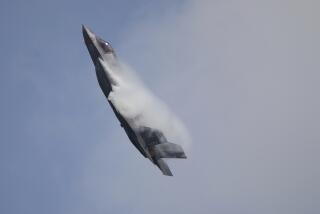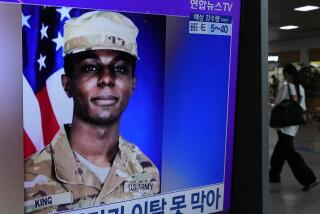U.S. Pilot Admits ‘Illegal’ Flight, N. Korea Says
- Share via
WASHINGTON — The stalemate over a captured U.S. military helicopter pilot in North Korea took a new twist Wednesday as the Pyongyang government said that he has admitted making an “illegal intrusion” into the country.
“I admit that this criminal action is inexcusable and unpardonable,” pilot Bobby Hall was quoted as saying in a statement released by North Korea’s official news agency. “However, at home, my parents, wife and kids are anxiously waiting for my return to them.”
U.S. officials said they could not confirm the authenticity of the seven-page, handwritten statement.
Earlier in the day, President Clinton denied North Korean allegations that Hall was on an intelligence mission when he was shot down.
According to Pyongyang, Hall admitted he was on a reconnaissance mission when his helicopter “deviated from the route” and crossed into North Korean airspace.
He is now pleading for mercy, the statement said. “I only hope, and it is my desire, that the Korean People’s Army will leniently forgive me for my illegal intrusion so that I may return to my home and be with my family again.”
It was not clear whether the statement, fabricated or not, might be a step toward ending the standoff over the pilot’s fate or was yet another complication to a peaceful resolution.
Pyongyang has indicated that the U.S. government should apologize for spying in connection with the flight, in which the helicopter flown by Hall and fellow Army pilot David Hilemon crossed into North Korean airspace on Dec. 17 and was shot down, killing Hilemon. It was not immediately apparent whether the North Koreans considered Hall’s statement tantamount to a confession of espionage.
Clinton’s denial on Wednesday was the first time the President had personally rejected the allegations.
The North Korean officials returned the remains of Hilemon, who was buried with military honors Wednesday in Gig Harbor, Wash., but they have kept Hall and said their investigation is still under way.
Clinton echoed the Administration’s account that Hall’s helicopter strayed across the border by mistake.
“He was on a routine training mission. That’s all,” the President told reporters at the White House. “They (Hall and Hilemon) made an error which we have acknowledged and drifted into North Korean airspace. . . . We want Airman Hall released. There is no reason to detain him. It was a routine training mission.”
Meanwhile, State Department official Thomas Hubbard, sent by the Clinton Administration to talk with officials in Pyongyang about Hall’s release, had no discernible success after his first day of meetings.
“As I understand the status of the talks that took place in North Korea today, they were not very satisfactory,” said Rep. Lee H. Hamilton (D-Ind.), outgoing chairman of the House Foreign Affairs Committee.
Last weekend, the United States expressed regret for the helicopter’s navigational errors. But in recent days, some Administration officials have come to believe that North Korea might be seeking an outright American apology for espionage.
Administration officials said they cannot and will not make such an apology, because the helicopter was not on a spy mission. Clinton’s public statement might have been designed to douse cold water on North Korean hopes for such an apology.
President Lyndon B. Johnson formally apologized to North Korea in 1968 when it was holding the American crew of the U.S. electronic surveillance ship Pueblo, which was monitoring communications off North Korea’s coast. But Johnson retracted the apology soon afterward, saying it was made only to obtain the crew members’ release.
Hubbard met for about 2 1/2 hours with officials of North Korea’s Foreign Ministry. Additional sessions are scheduled today.
Some analysts in Washington believe that the helicopter incident has touched off a dispute in Pyongyang between the Foreign Ministry, whose officials tend to favor releasing Hall to avoid further antagonizing the United States, and the Korean People’s Army, whose hard-line military leaders are said to be pushing to hold Hall.
Asked whether some officials in Pyongyang might be trying to use the Hall incident to scuttle the nuclear accord signed by the United States and North Korea in October, State Department spokesman Mike McCurry replied: “Everybody has theories. But we don’t have . . . substantive facts that would allow us to make that conclusion.”
More to Read
Sign up for Essential California
The most important California stories and recommendations in your inbox every morning.
You may occasionally receive promotional content from the Los Angeles Times.










